区别将来进行时VS一般将来时
区别:将来进行时_VS_一般将来时

将来进行时VS 一般将来时1. 概念:将来进行时主要表示将来某一时间正在进行的动作,或表示要在将来某一时间开始,并继续下去的动作。
常用来表示礼貌的询问、请求等。
(1)如:This time next day they will be sitting in the cinema.What will you be doing at six tomorrow evening?I’ll be meeting him tomorrow/ some time.我明天/某个时间将去见他。
2)常用的时间状语:Soon, tomorrow, this evening,on Sunday, by this time,in two days, tomorrow eveningBy this time tomorrow, I'll be lying on the beach. 明天的这个时间,我将会海滩上。
2. 将来进行时的形式:将来进行时由“动词be的将来时+现在分词”构成,具体形式见下表:人称单数复数第一人称I shall/will be leaving. We shall/will be leaving.第二人称You will be leaving. You will be leaving.第三人称He/She/It will be leaving. They will be leaving.3. 将来进行时的基本用法:将来进行时表示在将来某一时间内正在进行的动作。
将来进行时有很强的推测性,因此人们往往在以下几种场合中使用它:★(1)表示将来某一时间正在进行的动作,一般带状语。
如:What will you be doing at this time next Monday? 星期一的这个时间你将干什么?When he comes to my house tomorrow, I will be writing the report.明天他来我家时,我将在写报告。
一般将来时和将来进行和过去将来

((CC)) to表i示nd过ic去at的e a安p排as或t 计arr划angement.
e.g. I was meeting him in town the next day.
((DD)) t表o 示m将ea来n 的tha事t 情th确e f实ut发ur生e a了ction actually happened.
2) —What are you going to do this afternoon?
—I am going to the cinema with some friends. The film _______ quite early, so we _______ to the bookstore after that. (NMET 2005年 重庆)
表示与安排,计划或时刻表有关的动作; 或用于if, when等状语从句中代替will do.
练习题
1. Don't cry.The sun __w_il_l_r_is_e___(rise) all the same tomorrow.
2. --Don't make such a mistake. --No.I ______. A.don't B.won't
A. finished; are going B. finished; go
C. finishes; are going D. finishes; go
3) Because the shop ________ , all the T-shirts are sold at half price. (NMET 2004年 浙江)
When will you come again?
将来进行时学案
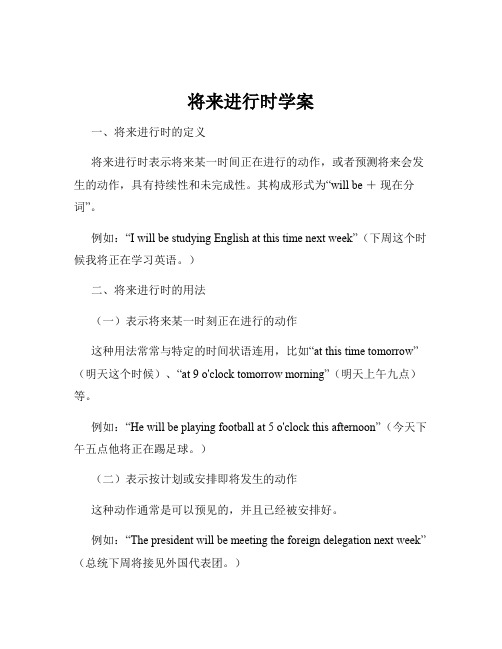
将来进行时学案一、将来进行时的定义将来进行时表示将来某一时间正在进行的动作,或者预测将来会发生的动作,具有持续性和未完成性。
其构成形式为“will be +现在分词”。
例如:“I will be studying English at this time next week”(下周这个时候我将正在学习英语。
)二、将来进行时的用法(一)表示将来某一时刻正在进行的动作这种用法常常与特定的时间状语连用,比如“at this time tomorrow”(明天这个时候)、“at 9 o'clock tomorrow morning”(明天上午九点)等。
例如:“He will be playing football at 5 o'clock this afternoon”(今天下午五点他将正在踢足球。
)(二)表示按计划或安排即将发生的动作这种动作通常是可以预见的,并且已经被安排好。
例如:“The president will be meeting the foreign delegation next week”(总统下周将接见外国代表团。
)(三)表示委婉语气有时,将来进行时可以比一般将来时更委婉、更礼貌。
例如:“Will you be using the computer this evening? I need to do some work on it”(今晚你会用电脑吗?我需要用它做些工作。
)三、将来进行时与一般将来时的区别(一)侧重点不同一般将来时侧重于表示将来要发生的动作或存在的状态,是一个比较笼统的概念。
将来进行时则强调在将来某个具体的时间正在进行的动作,更具具体性和形象性。
(二)时间状语不同一般将来时常用的时间状语有“tomorrow”(明天)、“next week”(下周)等。
将来进行时常用的时间状语有“at this time tomorrow”(明天这个时候)、“from 8 to 10 tomorrow morning”(明天上午八点到十点)等。
英语时态的区别

现在时
现在完成进行时
现在完成进行时表示过去开始 的动作一直持续到现在,并且 可能会继续下去。它的基本形 式是have/has加上动词的现在 分词形式。例如:I have been studying for the past hour 。我学习了一个小时了
2
过去时
过去时表示过去发生的事情。它包括一般过 去时、过去进行时、过去完成时和过去完成 进行时
将来时
将来进行时
将来进行时表示将来某个时间正在进行的动作或存在的状态。它的基本形式是will加 上动词的现在分词形式或用be going to表示。例如:I will be studying at this time tomorrow night.我明天晚上这个时候将会在学习。(或)I'm going to be studying at this time tomorrow night.我打算明天晚上这个时候将会在学习
完成进行时
现在时
现在进行时
现在进行时表示正在进行的动 作或存在的状态。它的基本形 式是be动词加上动词的现在分 词形式。例如:I am studying 。我正在学习
现在时
现在完成时
现在完成时表示过去发生的动作对现在造 成的影响或结果。它的基本形式是 have/has加上动词的过去分词形式。例如 :I have finished my homework。我已 经完成了我的作业
(或)He said he was going to be studying for the exam at this time tomorrow night.他说他打 算明天晚上这个时候将会在备考考试
6
过去将来完成时
过去将来完成时表示在过去某个时间对未来的某个动作已经完成的预测或过 去的某个条件下的结果
英语语法将来进行时讲解
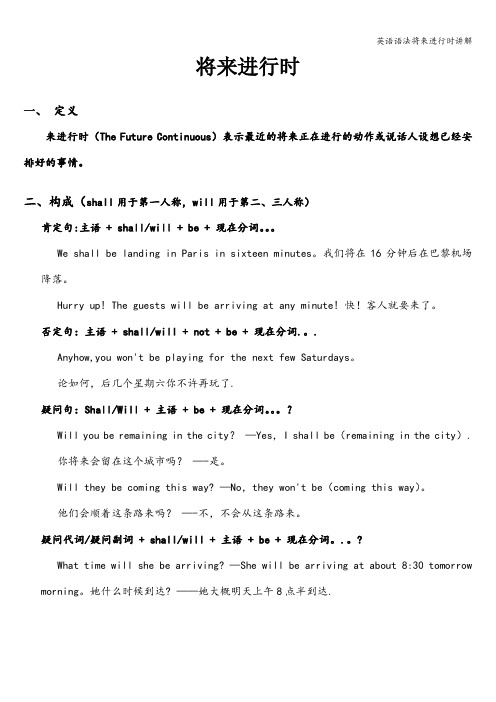
将来进行时一、定义来进行时(The Future Continuous)表示最近的将来正在进行的动作或说话人设想已经安排好的事情。
二、构成(shall用于第一人称,will用于第二、三人称)肯定句:主语 + shall/will + be + 现在分词。
We shall be landing in Paris in sixteen minutes。
我们将在16分钟后在巴黎机场降落。
Hurry up! The guests will be arriving at any minute! 快!客人就要来了。
否定句:主语 + shall/will + not + be + 现在分词.。
.Anyhow,you won't be playing for the next few Saturdays。
论如何,后几个星期六你不许再玩了.疑问句:Shall/Will + 主语 + be + 现在分词。
?Will you be remaining in the city?—Yes,I shall be(remaining in the city).你将来会留在这个城市吗?—-是。
Will they be coming this way? —No,they won't be(coming this way)。
他们会顺着这条路来吗?—-不,不会从这条路来。
疑问代词/疑问副词 + shall/will + 主语 + be + 现在分词。
.。
?What time will she be arriving? —She will be arriving at about 8:30 tomorrow morning。
她什么时候到达? ——她大概明天上午8点半到达.1。
6 将来进行时的用法1。
表示将来某一时刻或某一阶段内将要发生的动作一般只用于动态动词,不能用于静态动词:She’ll be leaving at about seven.她将在7点钟离开。
将来进行时

将来进行时定义将来进行时主要表示将来某一时间正在进行的动作,或表示要在将来某一时间开始,并继续下去的动作。
构成主语+ will + be + V-ing用法 1.表示将来某一时间正在进行的动作,一般带状语。
2.表示现在正在进行的动作,但这个动作会延续到将来。
3.表示预定的将来动作或对将来的预测。
4.表示委婉的请求5.表示原因、结果6.表示对将来的打算标志词Soon, tomorrow, this evening,on Sunday, by this time,tomorrow, intwo days, tomorrow evening将来进行时和一般将来时的区别:两者都表示将来的行为,但在用法上有所区别:(1) 将来进行时表示将来某一时刻或某一段时间里正在进行的动作;而一般将来时表示将来某时将要发生的动作。
(2) 将来进行时常用来表示说话人设想已经安排好的事;而一般将来时表示临时决定。
(3) 将来进行时不表示个人意愿。
(4) 将来进行时比一般将来时在语气上要委婉客气。
注:英语中有四类动词一般不用进行时1)表心理状态、情感的动词,如love ,hate ,like ,care ,respect ,please ,prefer ,know 等,若用进行时则词意改变。
2)表存在、状态的动词,如appear ,exist ,lie ,remain ,stand ,seem等3)表感觉、感官的动词,如see ,hear ,feel ,smell ,sound ,taste等.4)表一时性的动词,如accept ,allow ,admit ,decide ,end ,refuse ,permit ,promise等。
动词时态一般将来时的用法

动词时态一般将来时的用法动词时态包含了多种不同的形式,每种形式都传达了特定的时间信息。
在英语中,一般将来时是用来表达将来发生的动作、事件或状态的。
本文将详细介绍一般将来时的用法,并提供一些例句来帮助读者更好地理解。
一、一般将来时的定义一般将来时是用来表达明确的将来发生的动作或状态。
通常使用的助动词是will或shall,根据主语的不同而定。
二、一般将来时的构成1. 肯定句结构:主语 + will + 动词原形例如:- I will go shopping tomorrow.- He will travel to Europe next week.2. 否定句结构:主语 + will + not + 动词原形,或主语 + won't + 动词原形例如:- She will not visit her grandparents this weekend.- They won't attend the party.3. 疑问句结构:Will + 主语 + 动词原形?例如:- Will you join us for dinner?- Will they arrive on time?三、一般将来时的用法1. 表达自愿或意愿一般将来时常常用来表达主观上的决定、打算或愿望。
例如:- I will help you with your project.- He will volunteer at the local charity organization.2. 表示未来的计划或安排一般将来时可用于描述预定的时间表或安排。
例如:- We will have a meeting at 9am tomorrow.- They will arrive at the airport in the evening.3. 表示预测或推测有时,我们可以根据现有的证据或情况,使用一般将来时来推测未来可能发生的事情。
将来进行时用法小结

将来进行时用法小结【口诀】“将来某时(段)正进行,预计不久要发生。
通常用在口语中,语气委婉顿生情。
"【用法】将来进行时由“助动词will / shall + be + 现在分词”构成,具体用法如下:(1)表示将来某时刻或某段时间正在进行的动作。
常与soon, tomorrow, this evening, on Sunday,by this time, in two days, tomorrow evening等表示将来的时间状语连用。
如:I will be having an English class at 8 tomorrow. 我明天八点钟正在上英语课.Mary will be working in the factory in the next two months.下两个月玛丽将在这个厂里工作。
(2)在口语中常用来表示按计划或安排即要发生的动作。
如:This time tomorrow I shall be flying to New York. 明天这个时候我将飞往纽约。
At 7:00 this evening I will be watching the news programmes on TV。
今晚七时,我将正在收看电视上的新闻节目。
(3) 表示预料不久要发生或势必要发生的事情或将来的某种可能性,说话人往往有“我料想"或“我估计”的含义。
如:We believe that peasants’ life wil l be getting better and better.我们相信农民的生活会越来越好。
If we don’t do so,we shall be making a serious mistake。
如果我们不那样做,我们就会犯严重的错误。
(4) 表示亲切或委婉的语气。
如:When shall we be meeting again? 我们什么时候再见面?【注意】在时间、条件等状语从句中,用现在进行时代替将来进行时.如:Be careful when you are crossing the street。
将来时的动词变化规则

将来时的动词变化规则
在英语中,将来时的动词变化规则通常是使用“will”或“shall”来表达。
具体来说,一般现在时和现在进行时的动词形式分别变为一般将来时和将来进行时。
1. 一般现在时:动词变为原型,如“go”变为“goes”。
2. 现在进行时:动词变为“will be + -ing”形式,如“am/is/are + -ing”变为“will be + -ing”。
需要注意的是,具体使用“will”还是“shall”来表达将来时态,要根据具
体语境和习惯用法来决定。
一般来说,“will”用于表达不确定的将来事件
或个人意愿,而“shall”用于表达确定计划或约定好的将来事件。
此外,还有一些特殊情况下需要使用其他形式来表达将来时态,如“be going to”等。
将来进行时
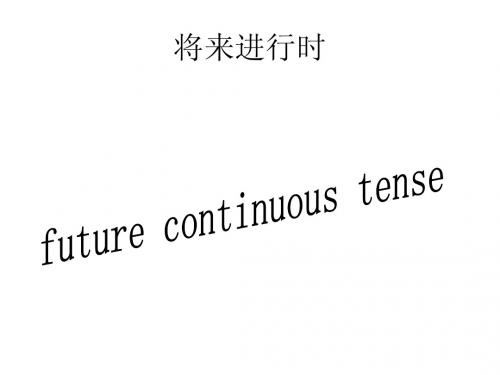
• When I get home, my wife will probably be watching television.
当我到家时,我太太可能正在看电视。
2. 将来进行时表示表示按时划或安排要发 生的动作
• I will be seeing you next week.
我下个星期来看你。 • I’ll be taking my holidays soon. 不久我将度假了。
• We shall be going to London next week. 下周 我们要去伦敦。
3. 将来进行时表示委婉语气
• Will you be having some tea? 喝点茶吧。 • Will you be needing anything else? 你还需要什么 吗? • 试比较: • When will you finish these letters? 你什么时候会处理完这些信件? (如上司对下属) • When will you be seeing Mr White? 你什么时候会见到怀特先生? (如下属对上司)
• Will you bejoining us for dinner?
你会和我们一起吃饭吗? (将来)
三、将来进行时与一般将来时的区别
• 1. 两者基本用法不一样
• 将来进行时表示将来某时正在进行的动作,一
般将来时表示将来某时将要发生的动作:
• What will you be doing this time tomorrow?
有时这两种结构在意义上确实不同,例如: • Mary won’t pay this bill. 玛丽不付账。(她拒绝付账) • Mary won’t be paying this bill. 玛丽不会付账。(将来) • Will you join us for dinner? 你来和我们一起吃饭好吗? (邀请)
一般将来时、将来进行时、将来完成时

⼀般将来时、将来进⾏时、将来完成时⼀般将来时/将来进⾏时/将来完成时⼀般将来时1.shall⽤于第⼀⼈称,常被will 所代替。
⼀是表⽰预见,⼆是表⽰意图.will 在陈述句中⽤于各⼈称,在征求意见时常⽤于第⼆⼈称。
Which paragraph shall I read first?Will you be at home at seven this evening?2.be going to +v.,表⽰将来。
1)主语的意图,即将做某事。
What are you going to do tomorrow?2)计划、安排要发⽣的事。
The play is going to be produced next month.3)有迹象要发⽣的事。
Look at the dark clouds, there is going to be a storm.3.be +to+v.表将来,按计划或正式安排将发⽣的事。
We are to discuss the report next Saturday.4.be about to +v.,意为马上做某事。
He is about to leave for Beijing.5. ⼀般现在时表将来1)下列动词:come, go, arrive, leave, start, begin, return的⼀般现在时表将来。
这主要⽤来表⽰在时间上已确定或安排好的事情。
The train leaves at six tomorrow morning.When does the bus stars? It stars in ten minutes.2)在时间或条件句中。
When Bill comes (不是will come), ask him to wait for me.I ’ll write to you as soon as I arrive there.6. ⽤现在进⾏时表⽰将来主要意义是表⽰按计划、安排即将发⽣的动作,常⽤于位置转移的动词。
时态与语态的区别
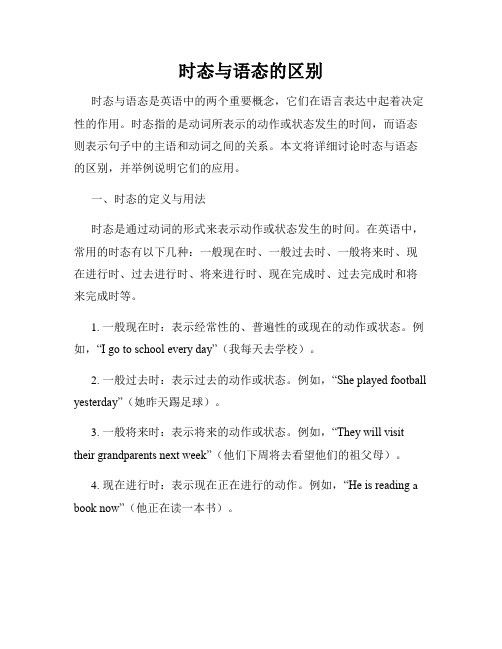
时态与语态的区别时态与语态是英语中的两个重要概念,它们在语言表达中起着决定性的作用。
时态指的是动词所表示的动作或状态发生的时间,而语态则表示句子中的主语和动词之间的关系。
本文将详细讨论时态与语态的区别,并举例说明它们的应用。
一、时态的定义与用法时态是通过动词的形式来表示动作或状态发生的时间。
在英语中,常用的时态有以下几种:一般现在时、一般过去时、一般将来时、现在进行时、过去进行时、将来进行时、现在完成时、过去完成时和将来完成时等。
1. 一般现在时:表示经常性的、普遍性的或现在的动作或状态。
例如,“I go to school every day”(我每天去学校)。
2. 一般过去时:表示过去的动作或状态。
例如,“She played football yesterday”(她昨天踢足球)。
3. 一般将来时:表示将来的动作或状态。
例如,“They will visit their grandparents next week”(他们下周将去看望他们的祖父母)。
4. 现在进行时:表示现在正在进行的动作。
例如,“He is reading a book now”(他正在读一本书)。
5. 过去进行时:表示过去某一时刻正在进行的动作。
例如,“They were playing basketball at 5 o'clock yesterday”(昨天五点钟他们正在打篮球)。
6. 将来进行时:表示将来某一时刻正在进行的动作。
例如,“We will be having a meeting at this time tomorrow”(明天这个时候我们将在开会)。
7. 现在完成时:表示过去某一时间开始,一直延续到现在的动作或状态。
例如,“I have studied English for ten years”(我已经学英语十年了)。
8. 过去完成时:表示在过去某一时间或动作之前已经完成的动作。
例如,“She had finished her homework before she went to bed”(她在睡觉前已经完成了她的家庭作业)。
一般现在时、现在进行时、一般将来时、将来进行时的用法及区别(知识梳理)
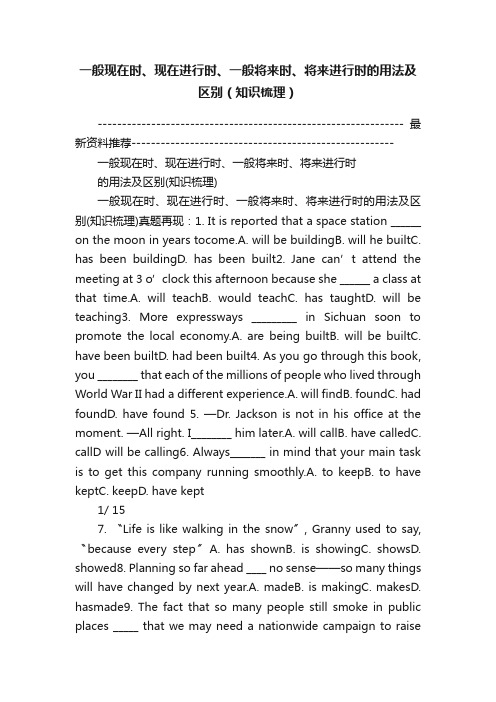
一般现在时、现在进行时、一般将来时、将来进行时的用法及区别(知识梳理)---------------------------------------------------------------最新资料推荐------------------------------------------------------ 一般现在时、现在进行时、一般将来时、将来进行时的用法及区别(知识梳理)一般现在时、现在进行时、一般将来时、将来进行时的用法及区别(知识梳理)真题再现:1. It is reported that a space station ______ on the moon in years tocome.A. will be buildingB. will he builtC. has been buildingD. has been built2. Jane can’t attend the meeting at 3 o’clock this aftern oon because she ______ a class at that time.A. will teachB. would teachC. has taughtD. will be teaching3. More expressways _________ in Sichuan soon to promote the local economy.A. are being builtB. will be builtC. have been builtD. had been built4. As you go through this book, you ________ that each of the millions of people who lived through World War II had a different experience.A. will findB. foundC. had foundD. have found 5. —Dr. Jackson is not in his office at the moment. —All right. I________ him later.A. will callB. have calledC. callD will be calling6. Always_______ in mind that your main task is to get this company running smoothly.A. to keepB. to have keptC. keepD. have kept1/ 157. 〝Life is like walking in the snow〞, Granny used to say, 〝because every step〞A. has shownB. is showingC. showsD. showed8. Planning so far ahead ____ no sense——so many things will have changed by next year.A. madeB. is makingC. makesD. hasmade9. The fact that so many people still smoke in public places _____ that we may need a nationwide campaign to raiseawareness of the risk of smoking.A. suggestB. suggestsC. suggestedD. suggesting10. That piece of music sounds quite familiar. Who _____ the pianoupstairs?A. has playedB. playedC. playsD. isplaying答案与解析:1. B。
英语将来进行时知识点

英语将来进行时知识点英语将来进行时知识点导语:将来进行时表将来,是进行时的一种。
下面YJBYS店铺向大家介绍将来进行时的一些基本知识,希望对你有用!将来进行时概念1)概念:表示将来某时进行的状态或动作,或按预测将来会发生的.事情。
She'll be coming soon.I'll be meeting him sometime in the future.注意:将来进行时不用于表示"意志",不能说I'll be having a talk with her.2)常用的时间状语Soon, tomorrow, this evening,on Sunday, by this time,tomorrow, in two days, tomorrow eveningBy this time tomorrow, I'll be lying on the beach.将来进行时的构成将来进行时主要表示将来某一时间正在进行的动作,或表示要在将来某一时将来进行时间开始,并继续下去的动作.常用来表示礼貌的询问、请求等.将来进行时由“will be+现在分词”构成。
如:I'll be doing jobs about the house tomorrow 明天我将要干些家务活。
I'll be staying late at the office this evening. 我将在办公室里待到比较晚。
将来进行时的用法1. 将来进行时的基本用法将来进行时表示将来某一时间正在进行的动作:Don't phone me between 5 and 6. We'll be having dinner then. 五点至六点之间不要给我打电话,那时我们在吃饭。
When I get home, my wife will probably be watching television. 当我到家时,我太太可能正在看电视。
(完整版)将来进行时的讲解及练习
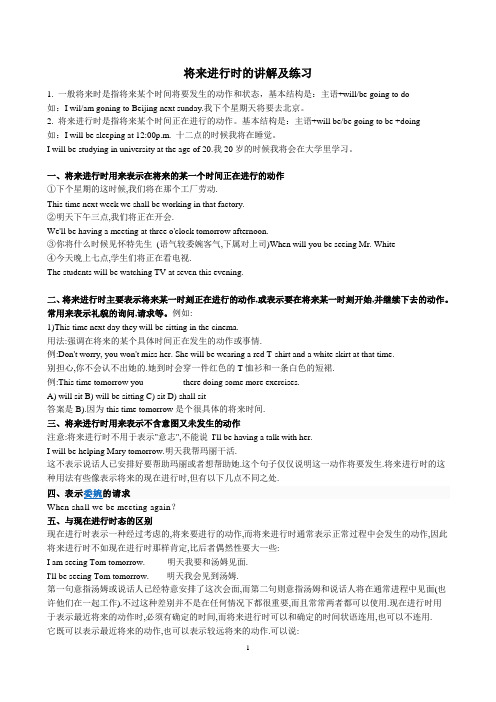
将来进行时的讲解及练习1. 一般将来时是指将来某个时间将要发生的动作和状态,基本结构是:主语+will/be going to do如:I wil/am goning to Beijing next sunday.我下个星期天将要去北京。
2. 将来进行时是指将来某个时间正在进行的动作。
基本结构是:主语+will be/be going to be +doing如:I will be sleeping at 12:00p.m. 十二点的时候我将在睡觉。
I will be studying in university at the age of 20.我20岁的时候我将会在大学里学习。
一、将来进行时用来表示在将来的某一个时间正在进行的动作①下个星期的这时候,我们将在那个工厂劳动.This time next week we shall be working in that factory.②明天下午三点,我们将正在开会.We'll be having a meeting at three o'clock tomorrow afternoon.③你将什么时候见怀特先生(语气较委婉客气,下属对上司)When will you be seeing Mr. White④今天晚上七点,学生们将正在看电视.The students will be watching TV at seven this evening.二、将来进行时主要表示将来某一时刻正在进行的动作,或表示要在将来某一时刻开始,并继续下去的动作。
常用来表示礼貌的询问,请求等。
例如:1)This time next day they will be sitting in the cinema.用法:强调在将来的某个具体时间正在发生的动作或事情.例:Don't worry, you won't miss her. She will be wearing a red T-shirt and a white skirt at that time.别担心,你不会认不出她的.她到时会穿一件红色的T恤衫和一条白色的短裙.例:This time tomorrow you ________ there doing some more exercises.A) will sit B) will be sitting C) sit D) shall sit答案是B).因为this time tomorrow是个很具体的将来时间.三、将来进行时用来表示不含意图又未发生的动作注意:将来进行时不用于表示"意志",不能说I'll be having a talk with her.I will be helping Mary tomorrow.明天我帮玛丽干活.这不表示说话人已安排好要帮助玛丽或者想帮助她.这个句子仅仅说明这一动作将要发生.将来进行时的这种用法有些像表示将来的现在进行时,但有以下几点不同之处.When shall we be meeting again?五、与现在进行时态的区别现在进行时表示一种经过考虑的,将来要进行的动作,而将来进行时通常表示正常过程中会发生的动作,因此将来进行时不如现在进行时那样肯定,比后者偶然性要大一些:I am seeing Tom tomorrow. 明天我要和汤姆见面.I'll be seeing Tom tomorrow. 明天我会见到汤姆.第一句意指汤姆或说话人已经特意安排了这次会面,而第二句则意指汤姆和说话人将在通常进程中见面(也许他们在一起工作).不过这种差别并不是在任何情况下都很重要,而且常常两者都可以使用.现在进行时用于表示最近将来的动作时,必须有确定的时间,而将来进行时可以和确定的时间状语连用,也可以不连用.它既可以表示最近将来的动作,也可以表示较远将来的动作.可以说:I am meeting him tomorrow. 我明天和他会面.I'll be meeting him tomorrow/next year/some time/. 我明天/明年/某时将与他会面.六、与一般将来时态的区别将来进行时通常表示的是对将来事实的简单陈述.而will+V. (一般将来时)除表示时间概念外,还带有感情色彩.e.g. 汤姆明天将正在割草. Tom will be cutting grass tomorrow.汤姆明天愿意割草. Tom will cut the grass tomorrow.将来进行时专项练习一、单项填空1. The Blacks with us for the time being.A. will stayB. would stayC. have been stayingD. will be staying2. The plane at the present speed until it crosses the mountain at about ten tonight.A. would goB. wentC. will be goingD. goes3. Mr. Smith will not be able to attend the meeting tonight because ______ then.A. he must have a classB. he will be teaching a classC. he teaches a classD. he will have been teaching a class4. I won’t be able to watch the concert on TV tonight because I homework at that time.A. shall have doneB. shall be doingC. shall doD. have been doing5. I _______ my boss at three this afternoon.A. shall be picking upB. shall be pickedC. shall have been picking upD. shall have picked6. You can’t miss Frank. He______ a dark green suit and a yellow tie waiting for you.A. is wearingB. will wearC. wearsD. will be wearing7. ----Could you give these books to Mr. Black?----Absolutely, _______him at five o’clock this afternoon.A.I will have a talkB. I have a talk withC.I can have a talk withD.I will be having a talk with8. I’m afraid I won’t be available then. I _____ a friend off at three t his afternoon.A. seeB. am seeingC. will seeD. will be seeing9. Next Friday I will go to another concert .They ____some thing by Mozart at that time.A. playB. will be playingC. are going to playD. are to play.10. ---What are you doing, Jack?---Make a model plane. I ____ it in the science class at 10 o’clock tomorrow morning.A. will be showingB. am going to showC. showD. have showed11. We _____ a debate on some environmental issues all afternoon tomorrow.A. will be havingB. am havingC. am going to haveD. have12. What do you think you _____at this time next year?A .will do B. will be doing C. are about to do D. do13. ---What will you do tomorrow evening?---I _____my favorite program between 8 and 11, then I will go out to drink in my usual bar.A. will watchB. am about to watchC. will be watchingD. am watching14. ---When will you come to see me, Dad?---I will go to see you when you_____ the training course.A. will have finishedB. will be finishingC. are finishingD. finish15. Tom sat under a tree and seeing his friend, up in no time.A. to standB. standingC. stoodD. would stand16. I _______ very happy if I could be of some service to you.A. would beB. have beenC. must beD. can be17. The meeting was to at 9 o’clock but the manager until twenty minutes later.A. start; didn’t turn upB. have started; didn’t turn upC. start; hadn’t turned upD. be started; hadn’t turned up18. ---- he come to see you?----Of course, please. And I’d rather he me the truth.A.Will; inform B.Shall; told C.Should; would say D.Can; spoke19. If the building project _____ by the end of this month is delayed, the construction company _____ fined.A. will be completed; is to beB. to be completed; will beC. being completed; will beD. completed; was20. ---- I rang you at about ten, but no one answered the phone.---- Oh, that was probably when I _______ my neighbor.A. visitedB. was going to visitC. was visitingD. had visited21. Because I the next day, I went to bed early on Saturday evening.A. was leavingB. will leaveC. had leftD. was about to leave22. ----Henry, fancy meeting you here.----Oh, it’s you Jack. Sorry, I ______ you ______ to me.A. didn’t think; w ere speakingB. don’t think; spokeC. didn’t think; would speakD. thought; are speaking23. By next summer John in this factory for thirteen years.A.has been working B.will have been workingC.will be working D.has worked24. He will have learned English for eight years by the time he __________ from the university next year.A. will graduateB. will have graduatedC. graduatesD. is to graduate25. I _______________ the office when the telephone rang.A. was about to leaveB. would leaveC. leftD. was to leave26. According to their agreement reached in 1943, no country ___________ peace with Germany alone.A. is to makeB. was to makeC. would makeD. was about to make27. He promised me if we_______ the game, he ________us a round of drink.A. win; will buyB. would win; would buyC. won; boughtD. won; would buy28. He said time and time again that he _________, but he actually stayed well after midnight.A. is leavingB. was leavingC. was to leaveD. will leave29. ----Mom, I got the first prize in the spelling contest.----Oh, how great! Daddy will be so proud of you. He _____ you _____ to win.A. never think; are goingB. never thought; were goingC. didn’t think; were goingD. hadn’t thought; were going30. Tom_________ to Jerry and tell him about his new school at once.A. will writeB. writesC. wroteD. writes二、用所给动词的适当形式填空1. He __________ (lie) on one of the sunny beaches in Hawaii all day when he spends his holiday there.2. Don’t call me between 2:00 and 4:00 this afternoon. I ________ (have) an test then.3. Nobody knew what ________ (happen) to the Eart h in a century’s time.4. Mr. Lee said he would give the CD to me as soon as he ______ (return) from Canada.5. When we were young, father________ (take) us for a special treat on Mother’s day.6. ----Did you invite Sarah to your birthday party?----Sorry, I forget. I _______ (call) her now.7. You have to put in more effort if you were _________ (pass) the test.8. I __________ (tell) you about my plan, but you stopped me before I could speak.9. Will you __________(use)your computer this time tomorrow?10. I __________ (close) the kitchen door when a little mouse popped its head out.三、中译英1. 我正打算往河里跳时看见水里出现一条蛇。
将来进行时的讲解及练习
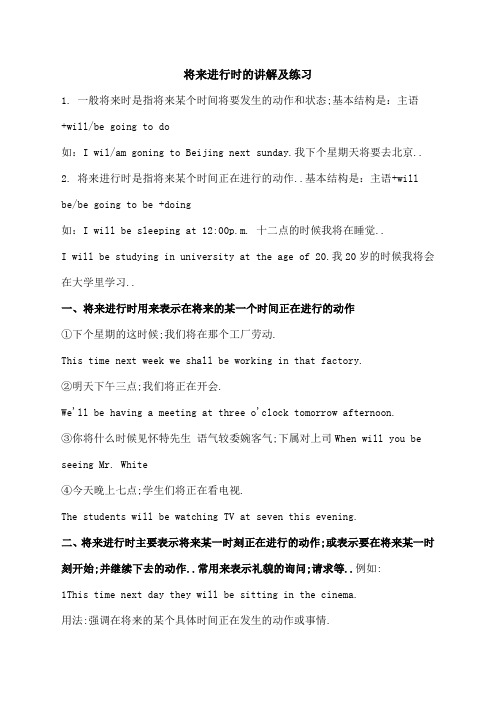
将来进行时的讲解及练习1. 一般将来时是指将来某个时间将要发生的动作和状态;基本结构是:主语+will/be going to do如:I wil/am goning to Beijing next sunday.我下个星期天将要去北京..2. 将来进行时是指将来某个时间正在进行的动作..基本结构是:主语+will be/be going to be +doing如:I will be sleeping at 12:00p.m. 十二点的时候我将在睡觉..I will be studying in university at the age of 20.我20岁的时候我将会在大学里学习..一、将来进行时用来表示在将来的某一个时间正在进行的动作①下个星期的这时候;我们将在那个工厂劳动.This time next week we shall be working in that factory.②明天下午三点;我们将正在开会.We'll be having a meeting at three o'clock tomorrow afternoon.③你将什么时候见怀特先生语气较委婉客气;下属对上司When will you be seeing Mr. White④今天晚上七点;学生们将正在看电视.The students will be watching TV at seven this evening.二、将来进行时主要表示将来某一时刻正在进行的动作;或表示要在将来某一时刻开始;并继续下去的动作..常用来表示礼貌的询问;请求等..例如:1This time next day they will be sitting in the cinema.用法:强调在将来的某个具体时间正在发生的动作或事情.例:Don't worry; you won't miss her. She will be wearing a red T-shirt and a white skirt at that time.别担心;你不会认不出她的.她到时会穿一件红色的T恤衫和一条白色的短裙. 例:This time tomorrow you ________ there doing some more exercises.A will sitB will be sittingC sitD shall sit答案是B.因为this time tomorrow是个很具体的将来时间.三、将来进行时用来表示不含意图又未发生的动作注意:将来进行时不用于表示"意志";不能说 I'll be having a talk with her.I will be helping Mary tomorrow.明天我帮玛丽干活.这不表示说话人已安排好要帮助玛丽或者想帮助她.这个句子仅仅说明这一动作将要发生.将来进行时的这种用法有些像表示将来的现在进行时;但有以下几点不同之处.四、表示的请求When shall we be meeting again五、与现在进行时态的区别现在进行时表示一种经过考虑的;将来要进行的动作;而将来进行时通常表示正常过程中会发生的动作;因此将来进行时不如现在进行时那样肯定;比后者偶然性要大一些:I am seeing Tom tomorrow. 明天我要和汤姆见面.I'll be seeing Tom tomorrow. 明天我会见到汤姆.第一句意指汤姆或说话人已经特意安排了这次会面;而第二句则意指汤姆和说话人将在通常进程中见面也许他们在一起工作.不过这种差别并不是在任何情况下都很重要;而且常常两者都可以使用.现在进行时用于表示最近将来的动作时;必须有确定的时间;而将来进行时可以和确定的时间状语连用;也可以不连用.它既可以表示最近将来的动作;也可以表示较远将来的动作.可以说:I am meeting him tomorrow. 我明天和他会面.I'll be meeting him tomorrow/next year/some time/. 我明天/明年/某时将与他会面.六、与一般将来时态的区别将来进行时通常表示的是对将来事实的简单陈述.而will+V. 一般将来时除表示时间概念外;还带有感情色彩.e.g. 汤姆明天将正在割草. Tom will be cutting grass tomorrow.汤姆明天愿意割草. Tom will cut the grass tomorrow.将来进行时专项练习一、单项填空1. The Blacks with us for the time being.A. will stayB. would stayC. have been stayingD. will be staying2. The plane at the present speed until it crosses the mountain at about ten tonight.A.would goB. wentC. will be goingD.goes3. Mr. Smith will not be able to attend the meeting tonight because ______ then.A.he must have a classB.he will be teaching a classC.he teaches a classD.he will have been teaching a class4. I won’t be able to watch the concer t on TV tonight because I homework at that time.A. shall have doneB. shall be doingC. shall doD. have been doing5. I _______ my boss at three this afternoon.A. shall be picking upB. shall be pickedC. shall have been picking upD. shall have picked6. You can’t miss Frank. He______ a dark green suit and a yellow tie waiting for you.A. is wearingB. will wearC. wearsD.will be wearing7. ----Could you give these books to Mr. Black----Absol utely; _______him at five o’clock this afternoon.A.I will have a talkB. I have a talk withC.I can have a talk withD.I will be having a talk with8. I’m afraid I won’t be available then. I _____ a friend off at three this afternoon.A. seeB. am seeingC. will seeD. will be seeing9. Next Friday I will go to another concert .They ____some thing by Mozartat that time.A. playB. will be playingC. are going to playD. are toplay.10. ---What are you doing; Jack---Make a model plane. I ____ it in the science class at 10 o’clock tomorrow morning.A. will be showingB. am going to showC. showD. have showed11. We _____ a debate on some environmental issues all afternoon tomorrow.A. will be havingB. am havingC. am going to haveD. have12. What do you think you _____at this time next yearA .will do B. will be doing C. are about to doD. do13. ---What will you do tomorrow evening---I _____my favorite program between 8 and 11; then I will go out to drink in my usual bar.A. will watchB. am about to watchC. will be watchingD. am watching14. ---When will you come to see me; Dad---I will go to see you when you_____ the training course.A. will have finishedB. will be finishingC. are finishingD. finish15. Tom sat under a tree and seeing his friend; up in no time.A. to standB. standingC. stoodD. would stand16. I _______ very happy if I could be of some service to you.A. would beB. have beenC. must beD. canbe17. The meeting was to at 9 o’clock but the manager untiltwenty minutes later.A. start; didn’t turn upB. have started;didn’t turn upC. start; hadn’t turned upD. be started; hadn’t turned up18. ---- he come to see you----Of course; please. And I’d rather he me the truth.A.Will; inform B.Shall; told C.Should; would say D.Can; spoke19. If the building project _____ by the end of this month is delayed;the construction company _____ fined.A. will be completed; is to beB. to be completed;will beC. being completed; will beD. completed; was20. ---- I rang you at about ten; but no one answered the phone.---- Oh; that was probably when I _______ my neighbor.A. visitedB. was going to visitC. was visitingD. had visited21. Because I the next day; I went to bed early on Saturday evening.A. was leavingB. will leaveC. had leftD.was about to leave22. ----Henry; fancy meeting you here.----Oh; it’s you Jack. Sorry; I ______ you ______ to me.A. didn’t think; were speakingB. don’t think; spokeC. didn’t think; would speakD. thought; are speaking23. By next summer John in this factory for thirteen years.A.has been working B.will have been workingC.will be working D.has worked24. He will have learned English for eight years by the time he __________from the university next year.A. will graduateB. will have graduatedC. graduatesD. is to graduate25. I _______________ the office when the telephone rang.A. was about to leaveB. would leaveC. leftD. was to leave26. According to their agreement reached in 1943; no country ___________ peace with Germany alone.A. is to makeB. was to makeC. would makeD. was aboutto make27. He promised me if we_______ the game; he ________us a round of drink.A. win; will buyB. would win; would buyC. won; boughtD. won; would buy28. He said time and time again that he _________; but he actually stayedwell after midnight.A. is leavingB. was leavingC. was to leaveD. will leave29. ----Mom; I got the first prize in the spelling contest.----Oh; how great Daddy will be so proud of you. He _____ you _____ to win.A. never think; are goingB. never thought; were goingC. didn’t think; were goingD. hadn’t thought; were going30. Tom_________ to Jerry and tell him about his new school at once.A. will writeB. writesC. wroteD. writes二、用所给动词的适当形式填空1. He __________ lie on one of the sunny beaches in Hawaii all day when he spends his holiday there.2. Don’t call me between 2:00 and 4:00 this afternoon. I ________ have an test then.3. Nobody knew what ________ happen to the Earth in a century’s time.4. Mr. Lee said he would give the CD to me as soon as he ______ return from Canada.5. When we were young; father________ take us for a special treat on Mother’s day.6. ----Did you invite Sarah to your birthday party----Sorry; I forget. I _______ call her now.7. You have to put in more effort if you were _________ pass the test.8. I __________ tell you about my plan; but you stopped me before I could speak.9. Will you __________useyour computer this time tomorrow10. I __________ close the kitchen door when a little mouse popped its head out.三、中译英1. 我正打算往河里跳时看见水里出现一条蛇..2. 下个月的今天我们将乘飞往去南美洲..3. 据报道;有一颗人造卫星将在酒泉被发射..4. 她本打算今年暑假去欧洲旅行;但金融危机使她丢了工作..5. 我的朋友告诉我他下个月就开始他的研究计划..四、真题回顾1. ---Come on in; Peter. I want to show you something.---Oh; how nice of you I ______ you ______ to bring me a gift.A. never think; are goingB. never thought; were goingC. didn’t think; were goingD. hadn’t thought; were going2. --We could have walked to the station; it was so near.---Yes. A taxi ______ at all necessary.A. wasn'tB. hadn't beenC. wouldn't beD. won't be3. .We were all surprised when he made it clear that he ___ office soon.A. leavesB. would leaveC. leftD. had left4. --- Alice; why didn't you come yesterday--- I _______; but I had an unexpected visitor.A. hadB. wouldC. was going toD. did5. ---Is there anything wrong; Bob You look sad.--- Oh; nothing much. In fact; I _____ of my friends back home.A. have just thoughtB. was just thinkingC. would just thinkD. will just be thinking6. ---Tom; you didn’t come to the party last night.--- I _____; but I suddenly remember I had homework to do.A. had toB. didn’tC. was going toD. wouldn’t7. In a room above the store where a party_______ ; some workers were busily setting the table.A. was to be heldB. has been heldC. will be heldD. is being held8. I _____ along the street looking for a place to park when the accident _______.A. went; was occurringB. went; occurredC. was going; occurredD. was going; had occurred9. --- Has your father returned from Africa yet--- Yes; but he _________ here for only three days before his company sent him to Australia.A. wasB. has beenC. will beD. would be10. ---Ring me at seven a.m.--- No; not that early I ________.A. sleepB. will sleepC. am sleepingD. will be sleeping11. You know; I ______ looking for a job for three months; and this is my first interview.A. amB. wasC. will beD. have been12. You’d better not phone the manager between 7 and 8 tomorrow evening;he ______ an important meeting then.A. will haveB. would haveC. will be havingD. will have had13. --- Do you have any problem if you _______ this job--- Well; I am thinking about the salary.A. offerB. will offerC. are offeredD. will be offered14. My uncle _________ until he was forty-five.A. marriedB.didn’t marryC. was not marryingD. wouldn’t marry15. --- Have you known Dr. Jackson for a long time--- Yes; since she ______ the Chinese Society.A. has joinedB. joinsC. had joinedD. joined参考答案一 1----5 DCBBA 6----10 DDDBA 11----15 ABCDC 16----20 ABBBC21----25 AABCA 26----30 BDBBA二 1. will be lying 2. will/ shall be having 3. would happen4. returned5. would take6. will call7. to pass8. was about to tell9. be using 10. was about to close三、中译英1. I was about to jump into the river when a snake appeared.2. We shall be flying to South America this time next month.3. It was reported that another satellite would be sent up in Jiu Quan.4. She was going to take a trip to Europe this summer vacation; but she lost her job to the financial crisis.5. My friend told me he would start his research project next month.四、真题回顾1----5 BABCB 6----10 CACAD 11----15 DCCBD。
表示将来的几种时态

使用情态动词来表示对未来的预测 或估计,例如“It will rain tomorrow.”(明天会下雨。)
与其他时态的区别
与现在时态的区别
现在时态描述当前正在发 生的事件,而情态动词表 示将来则描述未来的情况 或预测。
与过去时态的区别
过去时态描述过去发生的 事件,而情态动词表示将 来则描述未来的情况或预 测。
与过去进行时区别
过去进行时表示过去某一 时刻正在进行的动作,而 将来进行时表示将来的某 个时间正在进行的动作。
03 将来完成时
定义
01
将来完成时表示在将来某个时间 点之前已经完成的动作或状态。
02
这个时态强调动作或状态在未来 的某个时间点之前已经结束,并 对那个时间点之后的情况产生影 响。
用法
表示将来的几种时态
目录
CONTENTS
• 现在进行时表示将来 • 将来进行时 • 将来完成时 • 情态动词表示将来 • 将来时态的特殊用法
01 现在进行时表示将来
定义
定义
现在进行时表示将来,是指动作 或状态在将来发生或存在,但说 话人强调动作或状态正在进行或
即将开始。
结构
be动词(am/is/are)+动词ing 形式。
计划和安排
当计划在将来某个时间点之前完成某个动作或达到某种状 态时,可以使用将来完成时。例如:“我将在明天之前完 成这项工作。”
预测和期望
当基于现有信息预测将来某个时间点之前已经发生或完成 的情况时,可以使用将来完成时。例如:“到今年年底, 该公司预计将完成新产品的研发。”
条件和假设
在描述假设或条件下的动作或状态时,可以使用将来完成 时。例如:“如果明天下雨,比赛将被取消。”
- 1、下载文档前请自行甄别文档内容的完整性,平台不提供额外的编辑、内容补充、找答案等附加服务。
- 2、"仅部分预览"的文档,不可在线预览部分如存在完整性等问题,可反馈申请退款(可完整预览的文档不适用该条件!)。
- 3、如文档侵犯您的权益,请联系客服反馈,我们会尽快为您处理(人工客服工作时间:9:00-18:30)。
将来进行时VS 一般将来时
1. 概念:将来进行时主要表示将来某一时间正在进行的动作,或表示要在将来某一时间开始,并继续下去的动作。
常用来表示礼貌的询问、请求等。
(1)如:This time next day they will be sitting in the cinema.
What will you be doing at six tomorrow evening?
I’ll be meeting him tomorrow/ some time.我明天/某个时间将去见他。
2)常用的时间状语:
Soon, tomorrow, this evening,on Sunday, by this time,in two days, tomorrow evening By this time tomorrow, I'll be lying on the beach. 明天的这个时间,我将会海滩上。
2. 将来进行时的形式:
将来进行时由“动词be的将来时+现在分词”构成,具体形式见下表:
人称单数复数
第一人称I shall/will be leaving. We shall/will be leaving.
第二人称You will be leaving. You will be leaving.
第三人称He/She/It will be leaving. They will be leaving.
3. 将来进行时的基本用法:将来进行时表示在将来某一时间内正在进行的动作。
将来进行时有很强的推测性,因此人们往往在以下几种场合中使用它:
★(1)表示将来某一时间正在进行的动作,一般带状语。
如:
What will you be doing at this time next Monday? 星期一的这个时间你将干什么
When he comes to my house tomorrow, I will be writing the report.明天他来我家时,我将在写报告。
★ (2)表示现在正在进行的动作,但这个动作会延续到将来。
如:
I wonder if it will still be raining this afternoon.
I think that she will be working on this experiment until next morning.
★ (3)表示预定的将来动作或对将来的预测。
如:
Tomorrow I will be flying to Bombay.
After you take the medicine, you will be feeling much better.
★ (4)表示委婉的请求When shall we be meeting again
★ (5)表示原因Tomorrow morning, I'll be having a meeting.
★ (6)表示结果Stop the child or he will be falling over.
★ (7)表示对将来的打算(区别于对将来的预测)
My duties will end in July, and I'll be returning to Shanghai.
将来进行时用法:)~
概念:表示将来某时进行的状态或动作,或按预测将来会发生的事情.
如:I'll be meeting him sometime in the future.
形式:(肯定,否定形式以及一般疑问式)
常用的时间状语:
Soon, tomorrow, this evening,on Sunday, by this time,
tomorrow, in two days, tomorrow evening
By this time tomorrow, I'll be lying on the beach.
一将来进行时用来表示在将来的某一个时间正在进行的动作和按计划,安排,决定预料将要发生的事
①下个星期的这时候,我们将在那个工厂劳动.
This time next week we shall be working in that factory.
②明天下午三点,我们将正在开会.
We'll be having a meeting at three o'clock tomorrow afternoon.
③你将什么时候见怀特先生(语气较委婉客气,下属对上司)When will you be seeing Mr. White
④今天晚上七点,学生们将正在看电视.
The students will be watching TV at seven this evening.
二将来进行时主要表示将来某一时刻正在进行的动作,或表示要在将来某一时刻开始,并继续下去的动作.常用来表示礼貌的询问,请求等.例如:
1)This time next day they will be sitting in the cinema.
用法:强调在将来的某个具体时间正在发生的动作或事情.
例:Don't worry, you won't miss her. She will be wearing a red T-shirt and a white skirt at that time.
别担心,你不会认不出她的.她到时会穿一件红色的T恤衫和一条白色的短裙.
例:This time tomorrow you ________ there doing some more exercises.
A) will sit B) will be sitting C) sit D) shall sit
答案是B).因为this time tomorrow是个很具体的将来时间.
三将来进行时用来表示不含意图又未发生的动作
注意:将来进行时不用于表示"意志",不能说I'll be having a talk with her.
I will be helping Mary tomorrow.明天我帮玛丽干活.
这不表示说话人已安排好要帮助玛丽或者想帮助她.这个句子仅仅说明这一动作将要发生.将来进行时的这种用法有些像表示将来的现在进行时,但有以下几点不同之处.
◆将来进行时通常表示的是对将来事实的简单陈述.
而will+V. (一般将来时)除表示时间概念外,还带有感情色彩.
e.g. 汤姆明天将正在割草. Tom will be cutting grass tomorrow.
汤姆明天愿意割草. Tom will cut the grass tomorrow.
◆一般将来时是对将来的预测,一个表示将来要做的事,将来进行时,表示将来某个时点正在做
的事。
eg明天我要看书I'll read a book tomorrow.
明天十点我肯定正在看书I'll be reading a book 10:00 tomorrow.。
